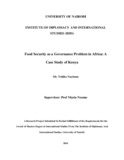| dc.description.abstract | Generally, the study is about Food Security as a Governance Problem in Africa: A Case Study of Kenya. It examines the causes of food security challenges in the African region, the nexus between food security and governance situation, the impact of governance on food security in Kenya and solutions regarding governance policies in place to ensure food security in Kenya.. The study sets out four hypotheses namely; scramble for Africa‘s governance has impacted negatively on food security in the region. There exists a relationship between governance and food security in Kenya. Governance issues in Kenya have an adverse impact on food security in the Country. There are solutions regarding governance policies in place to ensure food security in Kenya. The study which depended largely on primary and secondary data with intermediate use of thematic approach to present the information was situated within the post-development theory.
The study presumed that Food uncertainty has remained a noteworthy worry in the Country. As an aftereffect of environmental change, increment in temperatures and precipitation fluctuation will adversely affect on harvest and domesticated animals undertakings in many ranges. Mediations that improve cultivating groups' versatility to adjust to environmental change actuated impacts are vital for the acknowledgment of the rule destinations of the Food and Nutrition Security Policy. In spite of the acknowledgment of access to nourishment as a privilege in Article 25 of the Universal Declaration of Human Rights (1948), food security is still not generally regarded as a fundamental human right. The principle government test of the continuous sustenance uncertainty is the absence of interest in farming creation. The issue emerges when the emphasis on approaches, structures and organizations is put over that of the general population themselves. Access to business sectors is influenced by poor framework which builds the cost of transportation and hindrances in entering the market brought on by their constrained asset base, absence of data, absence of or deficient bolster foundations and poor arrangements set up. Different boundaries incorporate market benchmarks, constrained data, and necessities for substantial starting capital speculations, restricted item separation, and incapacitating approaches. Thus the determinants of food security cut across nations, regions and the globe. These determinants address the availability, accessibility, utility and stability of food security. They also look at the quality and quantity of food security. Although a lot of efforts have been put in addressing the food security there are still concerns on what determines it.
The study also concluded that the Kenyan Government has attempted to put in place governance structures so as to deal with the problem of food security for its people. There exist regional instruments that attempt to bring together the efforts of various countries so as to adequately address the problem of food security for its people. The policies and strategies aim to take out hunger and decrease destitution through horticulture so that the accompanying can be accomplished: dynamic rural markets inside and amongst nations and districts in Africa; ranchers being dynamic in the market economy and the mainland turning into a net exporter of rural items; a more fair dissemination of riches for country populaces; Africa as a vital player in rural science and innovation; and ecologically stable agrarian generation and a culture of practical government of common assets in Africa. | en_US |

